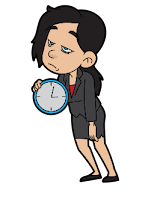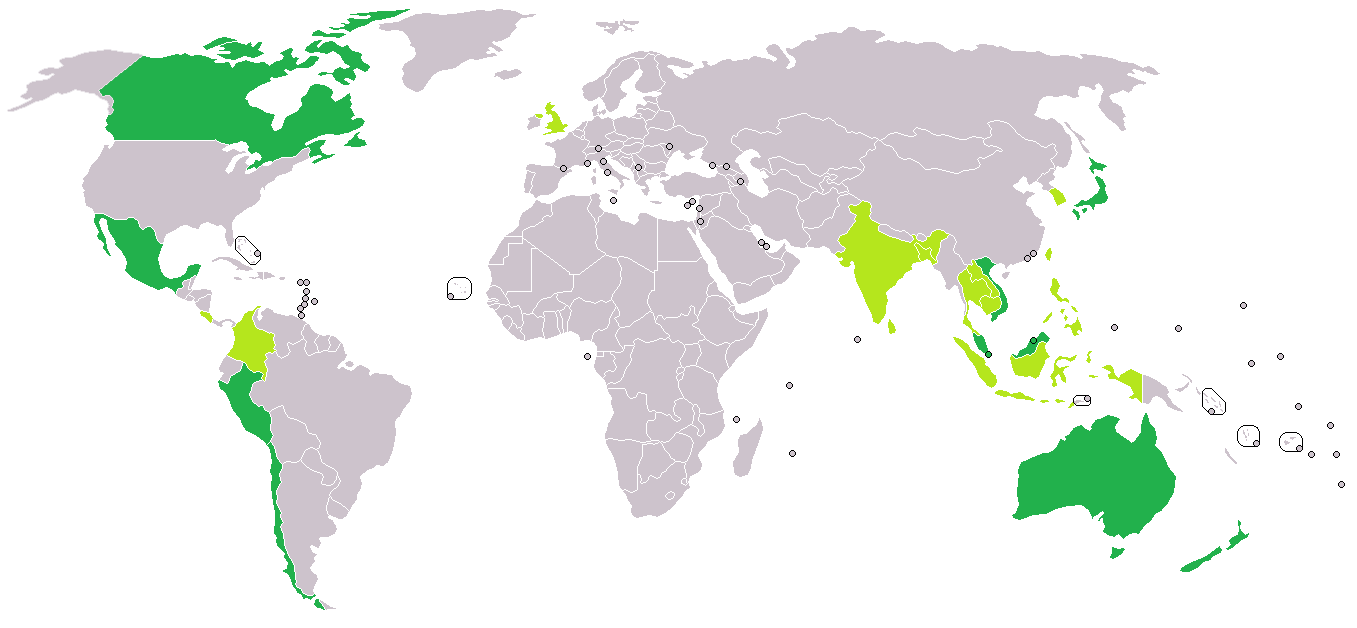 |
| 12 countries in dark green are currently part of the TPP. |
Wednesday, December 30, 2015
Text of the Trans-Pacific Partnership Agreement (Proposed)
Tuesday, December 29, 2015
Data Mining and Copyright
With increased activity on data analysis, big data, text mining, and the like, you might wonder if copyright law covers this type of use. U.S. copyright law has no specific exceptions related to text mining. However, in the U.K., there is guidance on this. The guidance says:
Could this be something the U.S. might provide guidance or specific rules on? If yes, is this something that might happen soon, or will we catch-up in 5-10 years?Text and data mining for non-commercial research
Text and data mining is the use of automated analytical techniques to analyse text and data for patterns, trends and other useful information. Text and data mining usually requires copying of the work to be analysed.
An exception to copyright exists which allows researchers to make copies of any copyright material for the purpose of computational analysis if they already have the right to read the work (that is, they have ‘lawful access’ to the work). This exception only permits the making of copies for the purpose of text and data mining for non-commercial research. Researchers will still have to buy subscriptions to access material; this could be from many sources including academic publishers.
Publishers and content providers will be able to apply reasonable measures to maintain their network security or stability but these measures should not prevent or unreasonably restrict researcher’s ability to text and data mine. Contract terms that stop researchers making copies to carry out text and data mining will be unenforceable.
Monday, December 28, 2015
Comments on a U.S. Legislative Framework Regarding Mass Digitization
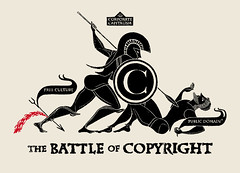 In June, I blogged about "Orphan Works and Mass Digitization: A Report of the Register of Copyright"and noted that there was a period for public comments. That period closed on Oct 9, 2015 and resulted in 83 comments. It is worthwhile looking at the list to see who submitted comments, and whether your professional association is among them. Yes, among the comments are people and organizations who are "pro" the idea being put forth (extended collective licensing) and those who are against it. One of the people against it is Dr. Cory Doctorow, who eloquently wrote:
In June, I blogged about "Orphan Works and Mass Digitization: A Report of the Register of Copyright"and noted that there was a period for public comments. That period closed on Oct 9, 2015 and resulted in 83 comments. It is worthwhile looking at the list to see who submitted comments, and whether your professional association is among them. Yes, among the comments are people and organizations who are "pro" the idea being put forth (extended collective licensing) and those who are against it. One of the people against it is Dr. Cory Doctorow, who eloquently wrote:As someone who depends on archives and libraries for research in my daily creative
labor, I count myself lucky to live in an era of such unprecedented access to works spanning many eras and regions.
At the same time, I'm also frustrated by collateral damage arising from the abolition of formalities for copyright registration, coupled with the extension of copyright terms. These two facts mean that much of the ephemera that tells the stories of everyday people from bygone eras are automatically copyrighted, with no visible rightsholder. They're orphan works, without any significant commercial value, but nevertheless protected by the "author's monopoly" for periods that will certainly outlast my life -- and my daughter's. In many (if not most) cases, it's likely that all extant copies will have vanished before they return to the public domain.The Copyright Office web page says that after the comment period, they will:
...seek to facilitate further discussion through stakeholder meetings and, if necessary, additional requests for written comment. Based on this input, the Office will draft a formal legislative proposal for Congress’s consideration.However, I see no indication that this work is continuing. I am, though, heartened by the words of the Register of Copyrights, Maria Pallante, during Congressional testimony on Dec. 2, 2015, when she said:
...I want to underscore that copyright law is chasing an exponential increase in the way people create, distribute, and consume copyrighted works.Let us hope the Copyright Office catches up AND begins to lead the effort in allowing more equitable use of copyrighted materials.
Wednesday, December 23, 2015
From the Lost & Found - CILDC : New Library Learning Experiences: STEAM and Video
In my end of the year cleaning - also known as the avoidance of grading papers - I found this draft blog post from the Computers in Libraries Conference, which I had never published. As the saying goes, better late than never!
The presenters were:
The presenters were:
- Mikael Jacobsen - Skokie Public Library
- Shauna Masura - Skokie Public Library
The
library went through a realignment. After the realignment, all of the
departments overlap. There are now departments on community engagement,
learning experiences, customer service, access, youth services, IT and
adult services.
They repurposed space to create new spaces for Learning Experiences, e.g., a media lab (an old office).
They
now do pop-up programming, rather than formal programming. Pop-up
programming is when the drop into the space with a quick program that
the kids can participate in. By not announcing it in advance, they can
change programs on the fly.
BOOMbox receives
new tools every three months for fabrication, design, etc. it is a
flexible space for flexible learning opportunities. Once an item is
removed from the room, it might then circulate for a while. The space
allows kids to try new things actively.
Skokie
is using badges to help students demonstrate that they have met their
learning goals. Their first badging system was the Maker Master
Challenge Badge, which was paper-based. Then the transferred what they
learned into a digital badge system. The system they used to build
their badging system was Captain Up, which was learned earlier this
year. While it received limited use, the feedback will be incorporated
into a new system.
An upcoming program will be on growing things and hydroponics. (Bloombox)
The BOOMbox is staffed by student volunteers and staff.
They are also participating in MOOCs, using a flipped classroom approach.
Friday, December 18, 2015
Happy Birthday and Other Public Domain Songs
In my copyright class, I have enjoyed talking about the sond "Happy Birthday" because it had been something that people didn't realize was still covered by copyright. But now it has been set free and the narrative in my class will have to change!
What happened? In short, a lawsuit that took more than two years. This is good news for businesses that have avoided using it. Now they can sing it, play it, and have no fear (and make no payments).
More about this at:
And for fun, here are James Corden and Josh Groban singing songs that are in the public domain. It's 7 minutes long and worth listening through the end.
What happened? In short, a lawsuit that took more than two years. This is good news for businesses that have avoided using it. Now they can sing it, play it, and have no fear (and make no payments).
More about this at:
- All the 'Happy Birthday' song copyright claims are invalid, federal judge rules, Sept. 22, 2015, http://www.latimes.com/local/lanow/la-me-ln-happy-birthday-song-lawsuit-decision-20150922-story.html
- ‘Happy Birthday’ Copyright Case Reaches a Settlement, Dec. 9, 2015, http://www.nytimes.com/2015/12/10/business/media/happy-birthday-copyright-case-reaches-a-settlement.html
- 'Happy Birthday' Copyright Suit Settled, Dec. 10, 2015, http://www.nbcnews.com/business/business-news/happy-birthday-copyright-suit-settled-n477671
And for fun, here are James Corden and Josh Groban singing songs that are in the public domain. It's 7 minutes long and worth listening through the end.
Tuesday, December 15, 2015
January - December 2016: Speaking/workshop/travel schedule
 |
| South St. in Philadelphia, PA |
- January 5-8: ALISE, Boston, MA. (#alise16) - ALISE is a conference for library and information science educators, as well as LIS deans and program directors/chairs. I register for this conference early and even before the schedule is known, because I know the sessions and the conversations will be excellent. As a MSLIS program director, this is a "must" conference for me.
- January 8-12: ALA Midwinter, Boston, MA. (#alamw16) - I'm not actually attending ALA Midwinter, but I am attending two ALA accreditation related meetings that are held during the conference. I'm also working the SU iSchool booth on Saturday morning (booth 948). I'm also visiting some LIS employers in Boston. (Want to suggest anyone?)
- March 8-10: Computers in Libraries (CIL), Washington, DC. (#CILDC) - I will be speaking twice on Thursday and one of those is with a group of colleagues. More about that later. I'll also be visiting some LIS employers in that area.
- June 12-14: SLA Annual Conference, Philadelphia, PA (#sla2016) -SLA is returning to Philly after being in that city in 2011. I am speaking at one session Sunday on copyright. More about that later. I believe the SU iSchool will have a booth at the conference and so look for me there.
If you are at any of the conferences above, please stop me and say "hi". If we can, let's grab a cup of coffee!
Below are conferences that I hope to attend this year. ALA Annual and IFLA are not a definite; however, it would be shame for IFLA to be this close and to not go!
- June 23-28: ALA Annual Conference, Orlando, FL (#alaac16)
- August 13-19: IFLA, Columbus, OH (#wlic2015)
- November 2 - 5: NYLA, Saratoga Springs, NY (#NYLA16)
Labels:
ALA,
ALISE,
CILDC,
Conference,
JHW,
NYLA,
SLA Conference
Monday, December 14, 2015
What’s New in Competitive Intelligence?
Last Friday, I spoke to one of the councils of the Manufacturers Association of Central New York on competitive intelligence. Since I don't like for a good handout to go to waste, I'm placing it here. Competitive intelligence is what I did as a corporate librarian and then when I started Hurst Associates, Ltd. Now that I'm an academic, I like talking with students about this work. It is not something the initially consider when they think about library science.
Friday, November 27, 2015
Article: Wisdom of the Crowd
During any holiday period, I try to catch up on my journal reading. (I don't think you really want to know how far behind I am!) Yesterday, I finally read this article by Matt Enis in the June 2015 issue of Library Journal. In "Wisdom of the Crowd", Enis discussed the crowdsourcing activities that libraries are using in order to make more of their collections available. He notes:
...in the past half decade, libraries have taken cues from long-running projects such as DP, using crowdsourcing as a way not only to outsource work that would be impossible for staff to attempt but also to engage volunteers.The article is full of excellent examples and strategies. If you're considering crowdsourcing aspects of your digitization program, for example, you might use this article to locate people and project to talk with about their practices.
Tuesday, November 24, 2015
The Creative Commons says "Trans-Pacific Partnership Would Harm User Rights and the Commons"
 The Creative Commons has analyzed the text of the Trans-Pacific Partnership (TPP) and found six items of concern related to copyright and the public domain. One of those concerns is the extension of copyright protection in those countries which do not already protect works for the life of the creator plus 70 years. The Creative Commons notes:
The Creative Commons has analyzed the text of the Trans-Pacific Partnership (TPP) and found six items of concern related to copyright and the public domain. One of those concerns is the extension of copyright protection in those countries which do not already protect works for the life of the creator plus 70 years. The Creative Commons notes:The ratification of the TPP would limit the size and diversity of materials that are available for everyone to build on, from art, music and other expressive cultural creations, to education resources to scientific research. It will also exacerbate the problem of orphan works, because those works would have entered into the public domain because their copyrights had expired. Instead, they’ll remain restricted by copyright for additional decades even though no ownership claim has been made, and no owner located to exercise the exclusive rights that copyright grants.
You might look at this and think "what does it matter?" Like most things, the impact will not be on you, but will be on those that come after us...those who can't use materials published in their own century, without seeking permission, because of copyright protection. To me, that seems wrong.
Monday, November 16, 2015
From Graduate Level Writing to Professional Writing
 Once I left graduate school, I went to work in industry which influenced how I write. Writing for me is not an academic exercise. Rather I write to make point, to influence, or to inform. My writing tends to be straightforward and not what I consider "academic."
Once I left graduate school, I went to work in industry which influenced how I write. Writing for me is not an academic exercise. Rather I write to make point, to influence, or to inform. My writing tends to be straightforward and not what I consider "academic."When I read student papers, I first look for students to write a a graduate level. Now...this is a "know it when I see it" difference between undergraduate and graduate writing. Undergraduate writing may not be as probing or analytical. (Yes, I know that is a broad assumption and it doesn't fit every undergraduate author.) When I give feedback on writing that I want to be more graduate-level work, then the question becomes how to convey that difference to someone.
So what is graduate-level writing? As I've talked to colleagues and former students, these points are mentioned:
- In a professional program (which library science is), the student is writing for his professional peers, which includes fellow students, faculty and members of the profession. This is different in tone and structure, I think, than undergraduate writing. It may be academic in style or may be more business like, depending on the assignment.
- Some consider that graduate students should strive to write in language similar to that of their professors. The student should try to strive - through his writing - to be a intellectual peer of the professor. If this uncomfortable for the student, then the student needs to strive to get comfortable with it.
- Graduate-level writing is not regurgitating information. Instead there needs to be synthesis.
- Graduate students are expected to immerse themselves in the topic. That immersion should be evident when someone reads the paper. That immersion does not necessary translate into a longer paper, but in how the topic is discussed.
- Graduate-level writing should include both the big picture and details. It is up to the student to understand how to balance both in the context of the paper.
- The paper should stand on its own. It does not leave people wondering because it contains holes.
- For me, professional-level writing is more succinct and more to-the-point.
- It might not have much theory in it, but rather focus on what is happening in the field.
- Structurally, professional works are laid out so that the executive can quickly locate specific sections to read. Subheadings and lists (bullet points) are using to organize the information.
- The material is actionable. In order words, it is clear how the information might be applied.
So how do I move a student from undergraduate-level writing to graduate-level writing, and then onto professional-level writing? With feedback, conversations, arm waving, and assignment descriptions. Or...in others, not in one step, but through what is likely a series of small steps. I have to get the student to know it when he/she sees it, and that is not easy. It can help if the students have a chance to view each other's work, but that needs to happen in a way that is comfortable for everyone. During that "view", I can ask students to notice formatting, synthesis, etc.
It can also happen through assigned readings, if students see those readings as representative targets for which they should strive.
I also think that you - internship site supervisors and people who see student work (perhaps it is a project they are doing for you) can also provide feedback. Tell the student what you're expectations are in terms of style and content, or how what they did would be different if done in a professional (non-academic) setting. Show them examples of work that you feel epitomizes what you are looking for. You might even recommend publications or writers that they can follow in order to be constantly exposed to the writing style for they should strive.
If you and I can help students improve their writing - even slowly - it will be helpful to them. We know that employers evaluate an applicants writing style in a number of ways, and so those students need to be able to shine when that happens.
--
Nov. 20, 2015: I've had conversations with people who appreciate that I wrote this post, but who also disagree with me on some of it. If you have a different point of view, PLEASE leave a comment! I think it would be helpful if employers and other faculty commented, especially if your opinion differs.
Tuesday, October 27, 2015
Podcast: The Myth of Serendipity
 Kevin Ashton, who wrote How to Fly a Horse: The Secret History of Creation, Invention, and Discovery, said:
Kevin Ashton, who wrote How to Fly a Horse: The Secret History of Creation, Invention, and Discovery, said:
The more you work, the more likely you are to succeed.That is not the message that you would expect to hear in a podcast about serendipity, but then perhaps serendipity is not what we think it is.
RN Future Tense did a 30-minute program on serendipity entitled "Designing for Serendipity." (See links below) In it there is also information on the myth of serendipity, hence the name of this blog post. We think serendipity just happens, but there is work behind serendipity. Serendipity is based on doing the work, never giving up, spotting opportunities, and engaging in opportunities.
Hearing the podcast reminded me of two "events":
- When I was a graduate library science student, many of the reference questions required me to go to the library and look for/through books. The subject area might contains dozens of books and I needed to find the one that contained the answer. I used to say that I found the correct book right before I passed out from exhaustion! It seemed like the mythical serendipity, but in reality I was doing the work and never giving up.
- Job offers can seem like the mythical serendipity. You hear people talk about an opportunity coming from "out of the blue". In reality that person has done something to make himself known and to demonstrate competence. It might mean that the person spotted opportunities that helped him demonstrate competence. The person definitely didn't just sit at home and wait. The person took action. (Yes, I had a job offer that fits into this category.)
I am still working on a large project. On this project, things don't just "happen", rather there is a lot of work that is going into every part of the project. Still some pieces might feel a little "serendipitous", yet when I look at those pieces I see that they were created by opportunities pursued and work completed.
Yes, doing the work creates opportunities. Sounds simple.
Designing for Serendipity notes and transcript: http://www.abc.net.au/radionational/programs/futuretense/designing-for-serendipity-segment/6847728
Designing for Serendipity Audio: http://mpegmedia.abc.net.au/rn/podcast/2015/10/fte_20151018_1030.mp3
Saturday, October 10, 2015
Article: How to think straight in the age of information overload
After writing a four-part series on the topic, it is nice to see that CNN published this article on decision fatigue just this week. The article contains info that supports my series, including:
Turns out, the neurons that are doing the business of helping us make decisions, they're living cells with metabolism, they require glucose to function, and they don't distinguish between making important decisions and unimportant ones. It takes up almost as much energy and nutrients to process trivial decisions or important ones.Go ahead...read the whole article and then work to lessen the number of decisions you're making by creating habits, routines, checklists, to-do lists or whatever it takes.
Friday, October 02, 2015
Decision Fatigue, Part 4
If you've just come across this four-part series, here are links to part 1, part 2 and part 3.
I noted is part 3 that decisions are made by groups as well as by individuals. Generally, we throw people into a room together, give them information, and ask them to make a decision...and then wonder why they can't make a decision and do it quickly.
First, groups work well together when they have time to get to know each other. Groups will sometimes engage in warm-up exercises or getting to know you exercises, and that is a start. However, being comfortable with each other and each other's style takes a lot longer than that. That learning about each other happens during meetings, in the hallway, and even over lunch. A group's ability to make decisions is honed as the groups makes small decisions (e.g., where to go for lunch) as well as big ones (e.g., which software to purchase).
Second, groups need to discover what role each person is playing in the group. There are a number of tests (e.g., Myer-Briggs) and other resources to help teams figure this out. What is your natural role on a team? Can you adopt a different role, if necessary, in order to bring a different perspective to the team? Can the team members voice this information to each other and keep it in mind as they work together?
Third, effective teams need to be able to be brutally honest with each other. Notice the "be able" in that sentence. You may not be brutally honest all the time ("I really hate that dress"), but you should be comfortable being brutally honest when it doing so helps the team and the decisions it is making. That ability does not happen overnight.
Fourth, teams need to have to-do lists, keep notes, etc., just like individuals do. They need to make guidelines, policies and procedures, which will cut down on the number of ad hoc decisions that need to be made. (By the way, if you have guidelines for how something is to done, recognize that the guideline outlines decisions that have already been made.)
Teamwork not only means that teams do work, but that it takes work to be a team. It also takes more work to be a team that can make decisions together and can do so with getting fatigued.
I hope this has been a worthwhile series for you to read. I know it has been a worthwhile series for me to write! If you think others would benefit from it, please pass it along.
Resources:
I noted is part 3 that decisions are made by groups as well as by individuals. Generally, we throw people into a room together, give them information, and ask them to make a decision...and then wonder why they can't make a decision and do it quickly.
First, groups work well together when they have time to get to know each other. Groups will sometimes engage in warm-up exercises or getting to know you exercises, and that is a start. However, being comfortable with each other and each other's style takes a lot longer than that. That learning about each other happens during meetings, in the hallway, and even over lunch. A group's ability to make decisions is honed as the groups makes small decisions (e.g., where to go for lunch) as well as big ones (e.g., which software to purchase).
Second, groups need to discover what role each person is playing in the group. There are a number of tests (e.g., Myer-Briggs) and other resources to help teams figure this out. What is your natural role on a team? Can you adopt a different role, if necessary, in order to bring a different perspective to the team? Can the team members voice this information to each other and keep it in mind as they work together?
Third, effective teams need to be able to be brutally honest with each other. Notice the "be able" in that sentence. You may not be brutally honest all the time ("I really hate that dress"), but you should be comfortable being brutally honest when it doing so helps the team and the decisions it is making. That ability does not happen overnight.
Fourth, teams need to have to-do lists, keep notes, etc., just like individuals do. They need to make guidelines, policies and procedures, which will cut down on the number of ad hoc decisions that need to be made. (By the way, if you have guidelines for how something is to done, recognize that the guideline outlines decisions that have already been made.)
Teamwork not only means that teams do work, but that it takes work to be a team. It also takes more work to be a team that can make decisions together and can do so with getting fatigued.
I hope this has been a worthwhile series for you to read. I know it has been a worthwhile series for me to write! If you think others would benefit from it, please pass it along.
Resources:
- Dymer, Chuck. "Six Hats to Manage Your Next Meeting." Successful Meetings 53.9 (2004): 30-31. Hospitality & Tourism Complete. EBSCO.
- 10 tips for Working Effectively in Groups
- 8 Teamwork Tips for Working with Unfamiliar Co-Workers
- How to be an Effective Team Member
Note: I'm an Amazon Associate, which means if you click on the Amazon link and make a purchase, I'll get a tiny commission. Tiny.
[Updated 08/25/2023]
Thursday, October 01, 2015
Decision Fatigue, Part 3
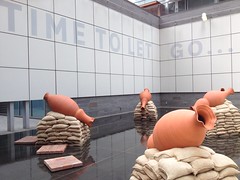 |
| Time to Let Go... |
In part 2, one of the resources was to a mind sweep exercise. The mind sweep exercise can be considered the groundwork for the planning and review process, which we often fail to do well. I had a client years ago where the client project team was continually remaking the same decisions over and over again, because they had not fully planned their work. Imagine the stress of knowing that a decision is not final and that it will get re-discussed and re-made at every meeting?
As a corporate librarian, I frequently got into the office early and had 10-20 minutes before the start of the day to review and plan. As a consultant, I generally used Sunday evenings as the time to look at the week again and get organized. As an academic, I have not set aside dedicated time for review and planning, which is impacting me. That time is important. During that time, we cannot only see what needs to be done, but also understand what decisions need to be made and by whom.
Let me focus on "by whom" for a moment. You know of decisions that need to be made, but do you know who is the correct person to make that decision? Does that person know that he/she is supposed to make that decision? Since more of our requests for decisions are made through email, be more purposeful in how to write them and in noting what the decision is and who is supposed to make it. If there are multiple people on the email, that let's everyone know that information and likely will relieve anxiety among those who wonder if the decision is theirs.
In addition to the mind sweep and specific times for planning/review, our minds need down time. That times when you aren't consciously making decisions. For me, that is time walking from here to there. Amazingly, even though I'm not consciously making decisions then, I will often find clarity on an issue or decision, and that was clarity that wasn't coming to me when my mind was filled with a myriad of different details.
Before this day ends, I want you to do two things. First, look at your calendar and find time in the next week to do a mind sweep and to do some planning (those might be two different events on your calendar). Second, go for a walk. It could be a walk around your building, up and down the stairs, or outdoors. Walk for five minutes (or more) and give your mind some down time. It will thank you for it!
Wednesday, September 30, 2015
Decision Fatigue, Part 2
 When I recognized the tell tale signs this summer of decision fatigue in my life, I was seeing something that I'd heard about. I remembered reading about it, but I didn't that it applied to me. My first clue was that making lunch (to take to work) became a chore. I got over that hump by making Mason Jar Salads.And then decision fatigue returned this summer. Sigh.
When I recognized the tell tale signs this summer of decision fatigue in my life, I was seeing something that I'd heard about. I remembered reading about it, but I didn't that it applied to me. My first clue was that making lunch (to take to work) became a chore. I got over that hump by making Mason Jar Salads.And then decision fatigue returned this summer. Sigh.Decision fatigue has a companion which is trying to keep track of too much in your head. Every team member, project manager and everyday human does this. And in our 24x7 world, with projects that get larger and longer, those details - and to-do's - are hard for your head to keep track of. You mind is constantly trying to ensure that it is remembering everything. For project managers, remembering "everything" is seemingly important because you never know when someone will ask you a question about the project. However, it's time to give your mind some help, so it will be less fatigued.
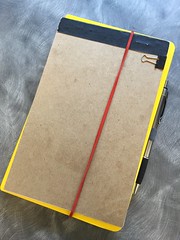 |
| My companion |
By the way, a very practical example of this is my syllabus. I tell my graduate students that I will refer to the syllabus when they ask me a question about an assignment or about the class schedule. Why? Because I've placed all the details in that document so I don't have to remember them. When I refer to the document, I know that I'll be consistent - okay, more consistent - in my answers.
Going back to the to-do list, if you're keeping a simple list and have not discovered how to better organize it OR how to better get all the to-do's on it, I highly recommend the book by David Allen entitled Getting Things Done: The Art of Stress-Free Productivity
Okay...so today's homework is for you to think about where you're keeping the information that you need to remember. Are you relying on your head? Could some of that information go on your device or on paper? If yes, adopt a tool (or tools) that you want to try out and give it a go.
Part 3 is coming tomorrow!
Resources:
- Getting Things Done: The Art of Stress-Free Productivity
- Podcast #3 – David Allen guides you through a Mind Sweep
- Transcript, Recording (23 minutes) [URL updated 10/1/2015]
Note: I'm an Amazon Associate, which means if you click on the Amazon link and make a purchase, I'll get a tiny commission. Tiny.
Tuesday, September 29, 2015
Decision Fatigue, Part 1
Decision fatigue.
We've all felt it, but likely have not realized that it is a real thing. Decision fatigue is when your mind (and I think also emotions) get tired from making decisions. What decisions? All those decisions that we make each day:
Yes, this about all of those projects that we're doing!
I've been working on a huge project, as well as being an academic program director, a professor, and a person with a life outside of work. I have found myself weary not because of the the work itself, but because of all of the decisions that the work includes. For example, my project includes a 200+ page document, which I'm editing. Every edit...every edit...is a decision. Yesterday that was easily over 100 decisions. Sadly, the chemicals in your brain are used the same for small decisions (put a comma there?) as well as large ones (what needs to go into the talking points?). And those chemicals need to be refreshed.
If you're like me and feeling fatigued from all of the decisions you're making, I want you to do three things and then be sure to read parts 2-4 of this series, which will be published later this week. The three things are:
Related Articles:
We've all felt it, but likely have not realized that it is a real thing. Decision fatigue is when your mind (and I think also emotions) get tired from making decisions. What decisions? All those decisions that we make each day:
- What time to get up?
- What to wear?
- Which emails to answer?
- How to do ____, which clearly needs to get done?
- What advice to give _____?
- Whether to go to the copier first or go to the bathroom first?
- Where to go for lunch?
- Whether to talk to _____ or ignore him?
- Turn left, turn right or go straight?
Yes, this about all of those projects that we're doing!
I've been working on a huge project, as well as being an academic program director, a professor, and a person with a life outside of work. I have found myself weary not because of the the work itself, but because of all of the decisions that the work includes. For example, my project includes a 200+ page document, which I'm editing. Every edit...every edit...is a decision. Yesterday that was easily over 100 decisions. Sadly, the chemicals in your brain are used the same for small decisions (put a comma there?) as well as large ones (what needs to go into the talking points?). And those chemicals need to be refreshed.
If you're like me and feeling fatigued from all of the decisions you're making, I want you to do three things and then be sure to read parts 2-4 of this series, which will be published later this week. The three things are:
- Acknowledge that the day is full of a multitude of decisions (as well as information to remember) and promise to learn how to lessen their impact.
- Update your to-do list with everything that you need to be doing. I co-mingle home, personal and work items on one to-do, but you might want to create separate to-do lists. (Okay...yes, something there is a very home-orientated to-do list on the refrigerator!) As new to-do's appear, add them to your list. And...yes...get ALL of those project to-do's on the list!
- Find places where you can stop making decisions. Can you begin to create routines that eliminate decisions? No, you don't have to eliminate every decision, but you might be able to eliminate a few.
Related Articles:
- Mark Zuckerberg wears the same thing every day—should you? from RN Future Tense
- Abstract: http://www.abc.net.au/radionational/programs/lifematters/2014-11-25/5909296
- Audio (14 minutes): http://mpegmedia.abc.net.au/rn/podcast/2014/11/lms_20141125_0923.mp3
- Do You Suffer From Decision Fatigue? http://www.nytimes.com/2011/08/21/magazine/do-you-suffer-from-decision-fatigue.html
- Analysis Paralysis – What Is It & How to Overcome as a College Student. https://psychologywriting.com/blog/analysis-paralysis-what-is-it-how-to-overcome-as-a-college-student/ (added 08/25/2023)
Tuesday, September 15, 2015
Article: What Ever Happened to Google Books?
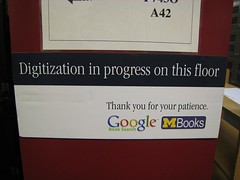 Tim Wu writes:
Tim Wu writes:Today, the project sits in a kind of limbo. On one hand, Google has scanned an impressive thirty million volumes, putting it in a league with the world’s larger libraries (the library of Congress has around thirty-seven million books).I remember when everyone was talking about Google Books. It grabbed our imaginations. As a digitization consultant, I thought it was something we'd be able to learn from. However, the ability to scan millions of books ran into the reality of authors' rights.
If you've not thought about this project for a while, this article sums it all up nicely. Of course, what it doesn't say is whether we'll ever get the access to those 35,000,000 volumes in the way that we want.
Friday, September 11, 2015
Looking ahead to 2016
 Time is going by too fast and 2016 will be here sooner than we know it. I'm already scheduling what I'll be teaching in 2016 and what conferences I'll be attending. I'm heartened that IFLA will be in Ohio and hoped to work that into my schedule! I'm also submitting proposals for a couple of conferences. What events do you think I should be adding in? Where do you think I should be submitting proposals? Leave a comment and give me some ideas. Help me shake up my 2016!
Time is going by too fast and 2016 will be here sooner than we know it. I'm already scheduling what I'll be teaching in 2016 and what conferences I'll be attending. I'm heartened that IFLA will be in Ohio and hoped to work that into my schedule! I'm also submitting proposals for a couple of conferences. What events do you think I should be adding in? Where do you think I should be submitting proposals? Leave a comment and give me some ideas. Help me shake up my 2016!
Tuesday, September 08, 2015
Just Need 15 Minutes
 As my work life gets more full of activities, my blogging decreases. Great blog posts don't make from my head to the Internet, and I regret that. The fullness of my life also means that I don't have large blocks of time for professional development. If it is something that I can listen to, then I might be able to do it while I walk from my car to my building (nearly a mile), but not every professional development opportunity is an audio file. However, starting this fall, I'm going to carve out 15 minutes each day to engage in a specific 30-week personal development activity. 15 minutes does seem like much, but over 30 weeks that will be 3150 minutes or 52.5 hours, which is a significant amount of time. In order to fit it in, I'm going to get up 15 minutes earlier each day. I'm sure that when I get up and it is still dark outside, that will seem like a real chore, but I know that it will be worth it.
As my work life gets more full of activities, my blogging decreases. Great blog posts don't make from my head to the Internet, and I regret that. The fullness of my life also means that I don't have large blocks of time for professional development. If it is something that I can listen to, then I might be able to do it while I walk from my car to my building (nearly a mile), but not every professional development opportunity is an audio file. However, starting this fall, I'm going to carve out 15 minutes each day to engage in a specific 30-week personal development activity. 15 minutes does seem like much, but over 30 weeks that will be 3150 minutes or 52.5 hours, which is a significant amount of time. In order to fit it in, I'm going to get up 15 minutes earlier each day. I'm sure that when I get up and it is still dark outside, that will seem like a real chore, but I know that it will be worth it.What professional or personal development do you need to be doing? How are you going to fit it in? Could spending 15 minutes a day on it make you a better project manager, a more values employee, or a sought after potential hire?
Thursday, August 13, 2015
Article: Artist outraged at ‘plagiarism’ of his sculpture in China
Oh dear...
If you follow the link above, you will see that this looks remarkably like "Cloud Gate" which is a sculpture in Chicago create by Anish Kapoor (right). Copying copyrighted works has been something that China has tolerated, but it is sad to see it done on this level.Kapoor is threatening to sue and I hope that he does.
Reports in China, including one from state-run media People’s Daily, say a ‘‘stainless steel sculpture in the shape of an oil bubble’’ will be unveiled later this month in Karamay, a city in the far northwestern region of Xinjiang known for its rich oil fields. Work on the sculpture began in 2013, at the site of the city’s first oil well.
 |
| Cloud Gate by Anish Kapoor |
The death of high fidelity?
I remember years ago when Sprint advertised its clarity for phone calls being so incredibly clear that you could hear a pin drop over the phone line (and that was a land line). The idea was that high fidelity was important and we all wanted phone calls where we could hear everything. This was also in an era, where people - who could afford to do so - invested in expensive stereo systems for their fidelity. Again, we wanted to hear everything.
The advent of the cell phone led us into an era of lower fidelity, where what we hear is governed by the quality of our phone (and the other person's phone), the telephone network, and the cell tower that the phone is using. The cell tower not only impacted the call quality, but also the features that the phone had available. Didn't get that voice mail message right away? It could have been the fault of the cell tower.
Over the years, our phones have gotten better and they do more including the ability to watch videos and listen to music. We can also stream that content onto our computers. Those streaming services have replaced our dependence on stereos and gotten us used to sound and videos that aren't high fidelity. In "Sorry, Neil Young, but you're wrong about streaming music", the author wrote:
In 2007, the report Shifting Gears: Gearing Up to Get Into the Flow was released, which contained a recommendation about digitizing for access, which meant not being as selective about quality. Sometimes lower quality is good enough. Our use of photographic and video media since then has demonstrated that low quality can indeed be acceptable.
Is the death of high fidelity coming? Nope. We do value high quality video, audio and photography...but not all the time. We do have times when that high quality is exactly what we want because we want the finer details. This is just like going to hear a band live, because we want to hear everything. So those people producing high fidelity audio, video and photography need to know that their market isn't totally going away. However, they do need to recognize that the market has shifted.
Sorry, Neil.
The advent of the cell phone led us into an era of lower fidelity, where what we hear is governed by the quality of our phone (and the other person's phone), the telephone network, and the cell tower that the phone is using. The cell tower not only impacted the call quality, but also the features that the phone had available. Didn't get that voice mail message right away? It could have been the fault of the cell tower.
Over the years, our phones have gotten better and they do more including the ability to watch videos and listen to music. We can also stream that content onto our computers. Those streaming services have replaced our dependence on stereos and gotten us used to sound and videos that aren't high fidelity. In "Sorry, Neil Young, but you're wrong about streaming music", the author wrote:
Spotify and Apple Music aren't noticeably amazing when it comes to sound quality, but then again, not noticeably bad. And they're so far above the respectability threshold for music listeners that nobody really thinks twice about it. It's pretty much OK for almost everyone.And from Jay-Z and Neil Young Won’t Make Streaming Music Better:
Numerous tech sites have tested the player, and have concluded that the average listener really can’t tell the difference between the Pono and other digital listening devices. Essentially, unless you have the right headphones, or stereo system, you’re paying $400 for a digital music player that’ll look weird in your pocket.Yup...acceptable. We've proven that we don't need or want high fidelity, or at least don't want it all the time. We're comfortable watching a low quality video on our phones and when the content warrants we'll watch a movie in IMAX. (Hint, most people don't go to IMAX, so lower quality is generally fine.)
In 2007, the report Shifting Gears: Gearing Up to Get Into the Flow was released, which contained a recommendation about digitizing for access, which meant not being as selective about quality. Sometimes lower quality is good enough. Our use of photographic and video media since then has demonstrated that low quality can indeed be acceptable.
Is the death of high fidelity coming? Nope. We do value high quality video, audio and photography...but not all the time. We do have times when that high quality is exactly what we want because we want the finer details. This is just like going to hear a band live, because we want to hear everything. So those people producing high fidelity audio, video and photography need to know that their market isn't totally going away. However, they do need to recognize that the market has shifted.
Sorry, Neil.
Monday, August 03, 2015
It - Whatever It Is - Must Speak for Itself
 |
| San Francisco City Hall |
Between 1998-2000, I worked on a small demonstration project, where we digitized material related to a group of suffragists in the Rochester, NY area. However, we did not include material from suffragists who had lived in Seneca Falls, NY, even though it was seemingly in the region. Why? Because the project sponsor (a consortium) did not have Seneca Falls in its region. We decided to (1) not directly address the absence of material from Seneca Falls and to (2) provide a description of the project's geographic location in a way that wasn't as informative as it could have been (especially to people outside of the U.S.). In essence, we created a web site that didn't say what people wanted to know and thus didn't truly speak for itself. It was a powerful lesson learned.
Today I find that we all still - intentionally or not - limit what our creations can say or explain on their own. We still do not fully describe what is or isn't available on a web site. We don't tell me how to contact us if they have question. We put bad signage on our buildings and in our libraries. We figure that people will ask, but forget that people use our materials, sites and buildings (or campuses) when we're not available. (And what if they ask someone who doesn't know?) The inability for it - whatever it is - to provide information on its own could cause people to consider it not worthwhile, and to never come back. Informative descriptions and signage empowers people, and people like feeling empowered so they are more likely to come back.
Consider your project, your web site, your building, your neighborhood - whatever it is - and think about whether it conveys information that people need, even when there is no one around to answer a question. If it doesn't, then you have some work to do.
Thursday, July 23, 2015
Respecting trademarks
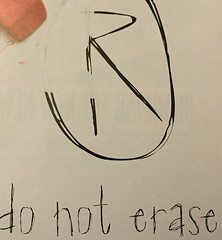 |
| Trademark: Do not erase |
- A trademark is generally a word, phrase, symbol, or design, or a combination thereof, that identifies and distinguishes the source of the goods of one party from those of others.
- A service mark is the same as a trademark, except that it identifies and distinguishes the source of a service rather than goods. Throughout this booklet, the terms “trademark” and “mark” refer to both trademarks and service marks.
In the June 1, 2015 Advertising Age magazine, Kimberly-Clark Worldwide, Inc. placed an advertisement asking that people respect its registered trademark on Kleenex® Brand Tissue. In the annals of trademark protection, there are stories about those marks which have not been well protected and which people use freely. A popular trademark for a brand of tissues falls into that category (i.e., Kleenex® Brand Tissue). Are all tissues called a ______? Most people do not realize that using the trademarked name for all tissues is disrespectful of Kimberly-Clark and their intellectual property.
Reclaiming a trademark, once people are used to abusing it, is a difficult task. However, I'll note that this ad was in an industry publication. Kimberly-Clark wants advertisers and other companies to respect their trademark, and they may be able to win that battle. I hope the company realizes that it will take more than one ad and that the topic will need to be addressed through several channels. I hope they also realize that this will need to be an ongoing concern for the company.
The image above was taken from the Kimberly-Clark advertisement. It is not the entire image, since I've tried to use as little as possible while still conveying the message.
Monday, July 20, 2015
Learning through failure
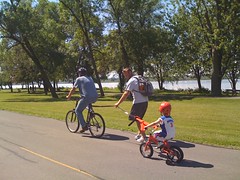 I like noticing people's language and the words that they use, and I especially like to notice if those words are positive or negative. We tend to say "don't" rather than "do", and warn people away from possible failures. However, every successful inventor, project manager, entrepreneur, executive and business owner has failed at least once (if not multiple times). We remember people for their successes and forgot about all the failures which occurred first. We learn much more through our failures than through our success.
I like noticing people's language and the words that they use, and I especially like to notice if those words are positive or negative. We tend to say "don't" rather than "do", and warn people away from possible failures. However, every successful inventor, project manager, entrepreneur, executive and business owner has failed at least once (if not multiple times). We remember people for their successes and forgot about all the failures which occurred first. We learn much more through our failures than through our success.In his daily Intensely Positive email, Kelvin Ringold said:
Children don't know about failing; children just know about doing! Trying! Having fun! They don't know failure until we teach it to them. Well, actually they DO know failure, but they don't call it that when they're kids. They call it learning... playing... exploring...trying... experimenting... seeing what happens... being curious... wondering "what if?"Notice the photo above. This was a failure - a child who got tired of biking - that was turned into a lesson and a success. These three generations learned a lot more through the failure than they would have through an initial success. Would you have used your belts this way?
As a digitization project manager, I learned much from the bumps that occurred in the projects. I learned more about the technology, the metadata, the budget, and all of the various processes. Every step backwards - or sideways - led to regrouping, learning and eventually a solid step forward. A wonderful saying is, "Retreat will move you forward" and I've found it to be very true.
Projects often teach you about your team, too. Does the team have the skills that it needs? Does the team have trust in each other? Are people willing to show initiative? Trust and initiative were topics which BJ Armstrong spoke on at the SLA Annual Conference. Trust/loyalty and initiative must be balanced with/against each other for it to work well. While we hope that people join the team with the correct skills, sometimes we need to stop and train people so that they have the skills for the job. In some instances, we may need to take people off the team and replace them with someone else, especially if there is no time to do the training. While those that leave the team may see it as a failure, I hope they see it as a call to continue to learn and a call to continue to invest in their own development.
Finally, failures teach each us about our own fortitude. Can we move on? Can we turn the failure into a future success? Rather than giving up, can we experiment, explore, try something different, and be curious? If yes, then we've already turned that failure into something positive.
Monday, July 13, 2015
Blog post: EU parliament defends Freedom of Panorama & calls for copyright reform
Julia Reda has been lobbying for specific reforms to the copyright laws in the European Union. On her blog last week, she announced a victory in terms of the "Freedom of Panorama, which allows anyone to publish photographs, documentary films and other works depicting public places without restriction." She noted that the ability for someone to take a photo with a building in the background and then post that photo online runs into copyright concerns that are not easily for a person to navigate. Lifting the restrictions made sense to her. Thankfully, it also made sense to the EU.
Reda also noted that:
Reda also noted that:
Reda is a proponent of copyright reform and as a member of the European Parliament, she's working hard to get it done. I wish her the best...and hope that she might also influence copyright reform in North America!Reforming exceptions to copyright protection must be at the center of [Commissioner Oettinger] initiative, since they fulfil such an essential, multi-facetted role: They provide creatives with the space to create new works, users with legal certainty for everyday activities, and access to culture and knowledge to everyone.
Thursday, July 09, 2015
Innovating Professional Conferences, Part 4: Ideas from colleagues
Last week, I published three blog posts on innovating professional conferences (part 1, part 2, part 3) and I appreciate the conversations that they began. A few people left comments on Twitter and Facebook, and I want to capture their ideas here.
Jan Holmquist suggests using face-to-face sessions to give participants a problem to solve and have them create solutions in the moment. While that might not work for every conference session, Jan believes that it could work for some. Imagine a conference where you hear a keynote on a specific topic, learn more in other sessions, then attend a session where you put what you have learned to practice to solve a practical problem. I can imagine people being interested in that type of conference or conference track.
Richard Hulser wants us to be back to the "smaller, more compact version of conferences that existed many years ago." For this to occur, I think conferences need to have a real focus and not try to be all things to all people. The innovation would be trimming sessions and topics, rather than adding.
Finally, Heather Braum noted that conferences are dependent on the topics and presenters selected. Some conference solicit proposals for conference sessions, while others have conference organizers who reach out to possible presenters. Both methods can yield very worthwhile and forward-thinking conference, or conferences that are not as inspiring as they could be. It takes a conference organizer or organizing committee who is focused on innovations (in the field applicable to the conference) to ensure that the conference is teaching knowledge, skills and abilities which are relevant to the participants' future.
One problem with conferences is that some plan their conference sessions 12 or more months in advance. That can mean that the organizers select topics that won't be forward-thinking, relevant or even interesting by the time the conference is held. Deciding on conference sessions 6-9 months before the conference likely feels like a "mad scramble", but it allows the organizers to better select themes, topics and speakers that will be more relevant.
Putting on a conference is more work than more people realize. Having conference organizers who are willing to innovate, rather than delivering the same experience from a decade ago, would improve them as a professional development opportunity. If you're a conference organizer, are you up for the challenge?
Jan Holmquist suggests using face-to-face sessions to give participants a problem to solve and have them create solutions in the moment. While that might not work for every conference session, Jan believes that it could work for some. Imagine a conference where you hear a keynote on a specific topic, learn more in other sessions, then attend a session where you put what you have learned to practice to solve a practical problem. I can imagine people being interested in that type of conference or conference track.
Richard Hulser wants us to be back to the "smaller, more compact version of conferences that existed many years ago." For this to occur, I think conferences need to have a real focus and not try to be all things to all people. The innovation would be trimming sessions and topics, rather than adding.
Finally, Heather Braum noted that conferences are dependent on the topics and presenters selected. Some conference solicit proposals for conference sessions, while others have conference organizers who reach out to possible presenters. Both methods can yield very worthwhile and forward-thinking conference, or conferences that are not as inspiring as they could be. It takes a conference organizer or organizing committee who is focused on innovations (in the field applicable to the conference) to ensure that the conference is teaching knowledge, skills and abilities which are relevant to the participants' future.
One problem with conferences is that some plan their conference sessions 12 or more months in advance. That can mean that the organizers select topics that won't be forward-thinking, relevant or even interesting by the time the conference is held. Deciding on conference sessions 6-9 months before the conference likely feels like a "mad scramble", but it allows the organizers to better select themes, topics and speakers that will be more relevant.
Putting on a conference is more work than more people realize. Having conference organizers who are willing to innovate, rather than delivering the same experience from a decade ago, would improve them as a professional development opportunity. If you're a conference organizer, are you up for the challenge?
Thursday, July 02, 2015
Innovating Professional Conferences, Part 3: Can we bring remote participants into a conference?
 After I started this series (part 1 & part 2), I spoke to Paul Signorelli about it and he sees the innovation needed as being different and I want to capture that idea here.
After I started this series (part 1 & part 2), I spoke to Paul Signorelli about it and he sees the innovation needed as being different and I want to capture that idea here.While I think that we need to move our professional development from conferences to the online environment, Paul believes that we need to use our online technology to bring remote participants to a face-to-face conference. Before the ALA Annual Conference, Paul outlined a myriad of ways that he thought it would occur. Near the end of the conference, Paul hosted a session to talk about and experiment with bringing remote participants into the room. They tweeted - and colleagues tweeted back - and they tried doing Google Hangouts with lots of people (and it worked).
Some conferences will not want to open their face-to-face sessions to virtual participants. They will see that as losing income, because they are giving away content. Others might charge for the privilege of attending virtually, so they can setup reliable technology in the conference areas to facilitate that interaction. Others will open the doors, by letting participants be the gateway on their devices and data plans for that interaction. You'll recognize that the last option is occurring at many conferences, but I don't know of a conference that has wired itself so remote participants are seamlessly included in every session.
While I like the idea of bringing remote/virtual participants into a conference, they would also need remote access to the exhibit hall or to information about what is in the exhibit hall (and more than just a short description). There would also need to be a way for ad hoc interactions, which happen at conferences. Paul and I discussed the idea of having kiosks or cameras where people on-site could interact with whomever is online. It would be a version of those random interactions that occur in the hallways or standing in line.
Are there other problems with conferences and other solutions? Yes. In fact, there are likely as many problems and solutions as there are conferences and conference participants. The key is being willing to change...and for some conferences, those changes a long overdue because their number of participants and exhibitors are dropping. If they believe that professional development is important, then now is the time to do it differently, before their audience is completely gone.
Innovating Professional Conferences, Part 2: How can librarians improve every conference?
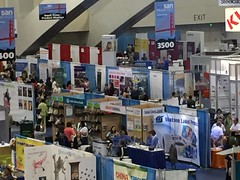 In part 1, I laid out some of the changes that are needed in professional conferences. Now I want us to consider one way that librarians can help improve professional development opportunities for everyone.
In part 1, I laid out some of the changes that are needed in professional conferences. Now I want us to consider one way that librarians can help improve professional development opportunities for everyone.If we decide that in-person conferences are no longer the the correct vehicle for professional development and we want to be more creative, there is one problem that we need to solve - copyright and/or content licensing.
If we move more to an online format for professional development, then we need to ensure that the supportive materials are there too. This is not difficult and some conferences are already posting handouts online. However, it is frequently done without advising the presenters about the rights that they have to their work and how the might protect those rights through a license (e.g., Creative Commons). To me, this is an area where librarians can have an impact on every conference. Librarians - hired by the conference organizers - could work with conferences to understand what rights they want to the presenters' work and for how long. Imagine that handouts, and other materials, are clearly marked with the rights that the participant has to them. And imagine that questions about items in those handouts around use/copyright clearance are answered by someone (a librarian), whose job it is to ensure that the materials are properly using and acknowledging the work of others.
Can an organization actually afford to hire a librarian to do this work? Yes, if the organization is serious about creating new/different professional opportunities, which includes moving face-to-face conferences to the online environment. Is this a full-time position? That I don't know and it might depend on what the organization is doing. If an organization that normally holds a yearly conference of 18,000+ people moves to offering online professional development sessions once a week, including several online conferences per year, that could justify a full-time librarian focused on the copyright and licensing of materials for use in those sessions.
I'd like to see librarians, who are knowledgeable in copyright and licensing, begin to approach conference organizers about ensuring proper licensing of their presenters' materials. Librarians might also consider giving conference sessions geared to the other presenters that focus on copyright and licensing of presentation materials in an online learning environment. This could be the start of us creating new positions for ourselves and for others appreciating our skills even more.
Finally, in talking to a colleague, there is one more innovation to discuss. That is in part 3.
Innovating Professional Conferences, Part 1: What's the problem?
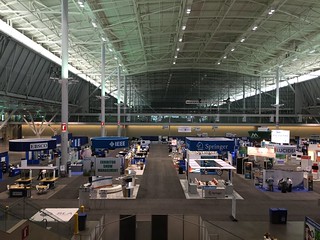 I began attending conferences in the late 1980s. I'm now able to attend several conferences a year and have been able to do so for several years. What is interesting to me - and a bit sad - is that conferences and exhibit halls have not changed in all that time in a major way. There are still many sessions, including some that are delivering old content, others that delivering content to only a few people, and a few that are forward-thinking. There is a large exhibit hall with many organizations displaying their products and services, and likely too few people visiting the booths. There are workshops, which are an additional fee, and a host of receptions, which are sponsored by someone who hopes to gain some marketing advantage.
I began attending conferences in the late 1980s. I'm now able to attend several conferences a year and have been able to do so for several years. What is interesting to me - and a bit sad - is that conferences and exhibit halls have not changed in all that time in a major way. There are still many sessions, including some that are delivering old content, others that delivering content to only a few people, and a few that are forward-thinking. There is a large exhibit hall with many organizations displaying their products and services, and likely too few people visiting the booths. There are workshops, which are an additional fee, and a host of receptions, which are sponsored by someone who hopes to gain some marketing advantage.Those who want to attend a conference need to decide which conference to go to out of the myriad of opportunities. The person has to review the conference program, understand the total cost, and then make a decision. We should note that conferences are expensive and many employers are being selective in the costs they will cover.
Small Changes to the Status Quo
Yes, conference organizers have tried to innovate. For example, once unconferences became popular, some conferences included unconference-like sessions, but did that last? Did that innovation have a larger impact on how we organize conferences? Seemingly the answer is "no."
We used to rely on conferences to provide continuing education opportunities, which could not be done locally. However, we now can learn via webinars and other means, which makes us less
reliant on conference sessions (as well as other face-to-face training events). In addition, those unique meetings which used to occur at conferences, where people from different geographic regions come together around a specific topic, can now occur using online meeting services.
We now have the ability to view and test new products almost instantly. We can talk to a company by phone or over the Internet, and view a demonstration using Internet technology. We can even negotiate with the company without a face to face meeting. We are no longer reliant on conference exhibit halls in order to see the latest innovations. In fact, the exhibit hall likely contains tools, technologies and services that we're already aware of.
If you look at the number of people, who are attending conferences, you'll notice that the numbers are decreasing. Yes, that is partially due to the economic downturns, but it is also due to people becoming reliant on other means of gaining professional development.
In all these years, we've innovated in other areas which impact conferences. For example, it is now easier for someone to locate and book a place to stay without going through the conference housing bureau. This lessens the conference organizer's ability to negotiate conference space and increases the cost of rooms for those that do use the conference housing service. Conference participants are using Airbnb, VRBO and a variety of other services to rent rooms and apartments at a lower rate than the rate charged by the conference hotels.
Changes Need to be More Dramatic
We now have the ability to view and test new products almost instantly. We can talk to a company by phone or over the Internet, and view a demonstration using Internet technology. We can even negotiate with the company without a face to face meeting. We are no longer reliant on conference exhibit halls in order to see the latest innovations. In fact, the exhibit hall likely contains tools, technologies and services that we're already aware of.
If you look at the number of people, who are attending conferences, you'll notice that the numbers are decreasing. Yes, that is partially due to the economic downturns, but it is also due to people becoming reliant on other means of gaining professional development.
In all these years, we've innovated in other areas which impact conferences. For example, it is now easier for someone to locate and book a place to stay without going through the conference housing bureau. This lessens the conference organizer's ability to negotiate conference space and increases the cost of rooms for those that do use the conference housing service. Conference participants are using Airbnb, VRBO and a variety of other services to rent rooms and apartments at a lower rate than the rate charged by the conference hotels.
Changes Need to be More Dramatic
I think we need to dramatically innovate our conferences.
First, we must meet people at that point where they have a need for professional development. That means using different delivery mechanisms for professional development, including webinars and other tools. It might even mean the development of specific tools that don't exist now.
Second, if we are delivering professional development that gives library and information professionals the training that they need when they need it, then we need to understand what the new role is for conferences as the exhibit halls that go with them. What do we need to come together in one spot to learn? What - in terms of what someone could learn - would justify the cost for attending such an event?
I believe that there is a role for librarians in helping to change how we receive professional development. In part 2, I'll give you the details.
Tuesday, June 16, 2015
SLA2015 : Trust, Loyalty & Initiative: What does it mean to be a leader?
Speaker: Commander Benjamin "BJ" Armstrong (US Navy), @wwatmd
Armstrong noted that his opinions are his own and not those of his employer or the U.S. Government. He is here a a civilian.
Leadership is not about school solutions or equations. It is not about scientific perfection.
Trust can be difficult for some leaders. It can seem ineffective. However, it is a key component of leadership. One of the things that distinguished Admiral Horatio Nelson (1758-1805) was the trust that he put into his sailors.
Nelson also trusted the voice within himself.
A.T. Mahan (1840-1914), reseacher and author, believed that trust was important to leadership.
William Sims (1858-1936) examined whatittookto be a good junior leader. He looked at "mission command" style of leadership. What does the junior office owe his boss? (1) Loyalty. (2) Initiative. These two things are in conflict with each other. Loyalty without initiative works if both sides are operating the same way. The balance between loyalty and initiative is key to a junior officer/manager success.
Subordinates must trust as will. For example, they must trust that the leader sees the bigger picture. They must know when to trust the leader and when to take initiative.
Self-reflection is an important part of maintaining the balance. Trust comes through thoughtful reflection.
All of us - including librarians - can benefit from being better leaders.
Nelson, at dinner every night, received input from his officers about what the ship was doing. He believed in receiving input.
Sims recognized that he didn't have the perfect right answer and so crowdsourced some answers and processed.
According to Sims, the trust in those that work for you should be implicit, until they prove you wrong. For those that you workfor, be more circumspect. They must earn your trust.
How does an organization's leadership rebuild trust? People need to demonstrate initiative in creating trust.
There is a difference between giving personal opinion versus professional opinion of your office.
Can leadership be taught? Do you need a foundation of information? Yes, there are some practical elements that we all need to learn. You need to encourage those that have some leadership skills to become better and to improve upon what the know. People need to keep developing their skills.
Learning what people have done in the past can help us understand what questions we need to ask to help us move towards the future.
Monday, June 15, 2015
SLA2015 : Let Freedom Ring
In case you wonder, yes, I've gone to a couple of sessions that are very much related to the consulting work that I used to do. The sessions have been good reminders of the wisdom that I need to pass along to my students.
----
----
Quick take session by Jennifer Burke on being an independent information professional (IIP). Her web site is
theinfohound.com
Being a librarian was a second career for her. She came from a marketing background. She then combined libraries + marketing consulting into being a independent Infomation consultant. This allowed her a sense of freedom.
Her question to us is "what will your trail be?"
Top tips for being an IIP:
- Think like a business person. It's not just about the research. Don't under value yourself. You'll spend more time on administration and marketing, then on research.
- Don't under estimate the amount of time that you will need to spend on marketing. From the very beginning, focus on this. Learn how to talk about what you do. Marketing is a constant. You need to network with your potential clients. Create a target market or niche. Being a generalist is too hard to sell. Do test your target market. Recognize that your target market will evolve over time.
- Time management is critical. Your clients are your boss and you need to work their hours. You need to work out the time management balance.
- Recognize that you can select the projects you want to work on and the clients you want to work with.
- Recognize that you need support. You may need a supportive partner. You'll need a cash reserve. You need clients that will rave about your services.
- And you'll need more support because you cannot do it all. You may need to outsource some of what you do or find subcontractors. Remember that you can barter.
- Remember that you are part of a community that can help to support you, perhaps just moral support. Yes, there are other consultants and information professionals that can be part of your community.
Sunday, June 14, 2015
SLA2015 : Keynote speaker: Leigh Gallagher
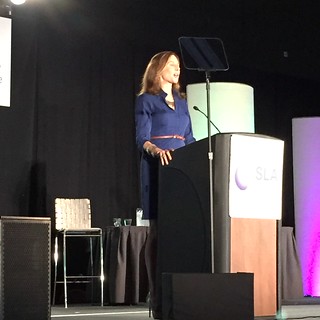 |
| Leigh Gallagher |
Leigh Gallagher (@leighgallagher) is an assistant editor at Fortune Magazine. She wrote The End of the Suburbs (book), which she heavily researched. As a journalist, information is the currency that she trades in. She reports to be an information junky.
Gallagher talked about her work and the research that she has done to help her. She has research done for interviews for Fortune magazine, for its conferences, and podcasts. She has a real respect for library and information professionals, and the work that we do. Gallagher filled her speech with many stories.
Gallagher ended with five things we can do to stand out and get the funding that we deserve:
- Market ourselves, especially to the C-suite, and toot our own horns. Consider sharing our knowledge with those that we work with. Just share a litle...you don't have to give it all away. Channel the best marketers in the world. (Coca-Cola)
- Quantify ourselves and our work. Connect our work to the bottom line. Show them the money.
- Be ahead of the curve and stay on top of new tools. We need to obsess about our product. (Apple)
- Provide high end customer service. (Four Seasons)
- Obsess on innovation. Could there be a uber-like product for libraries or for our organizations? (Uber)
Finally try asking our organizations what their world would be like with information professionals.
SLA2015 : The A-Z of Researching Private Companies
With Phil Britton from Ulta Beauty, sponsored by PrivCo.
Association and trade groups
Brokers - real estate, travel, etc.
Contractors and suppliers
Dun & Bradsteet
Ex-employees
Freedom of Information Act
Hoover's
Interviews and elicitation
Journals
Knowledge sharing and conference presentations
LinkedIn
Merger and acquisition disclosures
Newspapers - local ones are best - jobs, taxes, land
Operators - advanced Internet search techniques
PrivCo - private company financial intelligence
Quora.com (corrected, 8/21/2015)
Recruiters
Slideshare and other social media - postings by employees and interns
Trademark and patent filings - intellectual property including domain names
Universities - guest speakers
Vendors - 3rd party researchers
Wall St. Analyst's (financial) models and sector reports
X-reference - cross reference everything you've done thus far
Your internal company
Zoning variances/public hearings
Tuesday, June 09, 2015
Orphan Works and Mass Digitization: A Report of the Register of Copyrights
On June 4, the Copyright Office wrote:
The June 9, 2015 U.S. Federal Register contains the notice of a "Mass Digitization Pilot Program; Request for Comments", which is mentioned in the report. The notice can be viewed here.
I am not yet seeing anyone dissecting this report in a news article or blog post. My hope is that a few people will dig into the details and test the ideas presented. (Unfortunately, I'm tied up with a project and cannot take time to do so.) If you know of someone who has done this, please point me towards their work. (Thanks!)
The U.S. Copyright Office today released Orphan Works and Mass Digitization: A Report of the Register of Copyrights. The Report documents the legal and business challenges faced by good faith users who seek to use orphan works and/or engage in mass digitization projects. It provides a series of legislative recommendations that offer users a way forward out of gridlock, but also take into account the legitimate concerns and exclusive rights of authors and other copyright owners.Have they attacked those areas, where changes are needed? Yes.
With respect to orphan works, the Report provides draft legislation that draws upon the Shawn Bentley Orphan Works Act passed by the Senate seven years ago, albeit with some updates and changes that reflect intervening developments and public discussions.And...
The full 234-page report is available here.
With respect to mass digitization, the Report recommends a more incremental approach that would allow the United States to gain experience with an extended collective licensing framework that is in use or under consideration elsewhere in the world.
The June 9, 2015 U.S. Federal Register contains the notice of a "Mass Digitization Pilot Program; Request for Comments", which is mentioned in the report. The notice can be viewed here.
I am not yet seeing anyone dissecting this report in a news article or blog post. My hope is that a few people will dig into the details and test the ideas presented. (Unfortunately, I'm tied up with a project and cannot take time to do so.) If you know of someone who has done this, please point me towards their work. (Thanks!)
Wednesday, June 03, 2015
Article: The Bizarre Process We Use To Approve Exemptions To The Digital Milliennium Copyright Act
 Fast Company has an article about the process to decide on exemptions to the DMCA; a process that is occurring now. Part of this article focuses on online multiplayer games and the problem that occurs once the game becomes defunct. Of course, this isn't the only area that is seeking an exemption. However, is this the right way to go about deciding what receives an exemption and what does not? And I wonder how the Librarian of Congress really listens to and how he ultimately makes the decision. The article agrees that this process isn't the best. As it says:
Fast Company has an article about the process to decide on exemptions to the DMCA; a process that is occurring now. Part of this article focuses on online multiplayer games and the problem that occurs once the game becomes defunct. Of course, this isn't the only area that is seeking an exemption. However, is this the right way to go about deciding what receives an exemption and what does not? And I wonder how the Librarian of Congress really listens to and how he ultimately makes the decision. The article agrees that this process isn't the best. As it says:This triennial process is probably the worst thing that the companies that helped create the legislation could have wished for, because of the news coverage and consumer awareness that results. As more physical things become unrepairable and unmodifiable, even when software support is discontinued by a maker or the maker goes out of business, more people will face the choice between violating a law and getting what they believe they paid for.
Subscribe to:
Comments (Atom)
